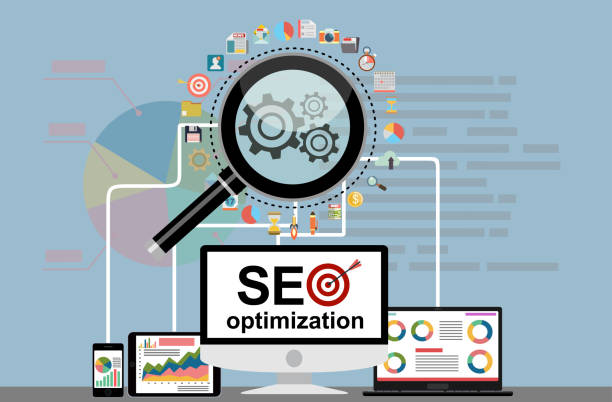Introduction to Search Engine Optimization (SEO)

In today’s digital world, an online presence is vital for every business and individual.
But merely having a website is not enough; you need to be visible to connect with your audience.
This is where the concept of Search Engine Optimization, or SEO, comes in.
SEO is a set of techniques and strategies that helps improve your website’s ranking in search engine results like Google.
The main goal of SEO is to increase #organic and #quality traffic to your website.
This traffic comes from users who are looking for your products or services, and therefore, the likelihood of converting them into actual customers is higher.
A #successful_SEO strategy not only helps increase visibility but also adds to your online credibility and authority.
Imagine your website being displayed on the first pages of Google; this means easier user access to you and an increased chance of being seen.
From an educational perspective, SEO is a complex science and art that requires continuous learning and knowledge updates.
Search engine algorithms are constantly changing, and what works today might not be effective tomorrow.
Therefore, it is essential for every webmaster and business owner to be familiar with the basic concepts of website SEO.
This introduction is just the tip of the iceberg, and we will delve into more specialized aspects of this field further on.
With this explanatory approach, we aim to familiarize you with the basic principles and critical importance of optimization for search engines so you can take firm first steps.
Losing potential customers due to an unprofessional website? Rasaweb is your answer! With our specialized corporate website design services:
✅ Enhance your business’s credibility and standing
✅ Experience attracting more targeted customers
⚡ Act now to receive a free consultation!
Key SEO Principles and Ranking Factors

After familiarizing yourself with the general concept of SEO, it’s time to delve into the key principles and factors influencing website rankings.
These factors are generally divided into three main categories: On-Page SEO, Off-Page SEO, and Technical SEO.
On-Page SEO includes all actions you can take within your website to improve its ranking.
These include content optimization with relevant keywords, URL structure improvement, optimizing Title Tags and Meta Descriptions, proper use of Heading tags (H1, H2, H3), and image optimization (Alt Text).
Off-Page SEO refers to activities performed outside your website that impact its credibility and authority.
The most important part of Off-Page SEO is building high-quality backlinks from other reputable websites.
These backlinks indicate to search engines that your website is trustworthy and authoritative.
Social media activity and brand mentions also fall into this category.
Finally, Technical SEO addresses the technical aspects of your website that affect its crawlability and indexability by search engines.
Website loading speed, mobile-friendliness, HTTPS usage, correct sitemap structure, and robots.txt file are among these considerations.
A comprehensive guidance approach in this area can help you ensure your website is technically sound and ready to compete.
Understanding these principles and implementing them correctly is specialized and essential for anyone looking to improve their position in search results.
Indeed, comprehensive SEO requires attention to all three areas to achieve the best results.
Keyword Research and Competitor Analysis: The Beating Heart of SEO

Keyword research and competitor analysis can be considered the backbone of any successful SEO strategy.
Before starting any optimization, you need to know exactly what phrases and words your target audience uses to search for your products or services.
This precise analytical process helps you create content that responds to real user needs while also being recognized by search engines.
Keywords are not just one or two words; they can also be longer phrases (long-tail keywords) which, although having lower search volume, indicate user intent more precisely and have higher conversion rates.
For example, instead of ‘coffee,’ ‘best coffee maker for daily use’ might be a longer and more targeted keyword.
After identifying relevant keywords, it’s time for competitor analysis.
This stage involves examining competitor websites that currently rank high for your target keywords.
By analyzing them, you can identify the strengths and weaknesses of your competitors’ SEO strategy and learn from them.
This way, you can discover opportunities your competitors might have overlooked or find better ways to use keywords.
This educational process gives you a comprehensive view of the market and your own position.
To perform this analysis, various tools such as Google Keyword Planner, Ahrefs, Semrush, and Moz Keyword Explorer are available.
Using these tools is essential for examining search volume, competition level, and related keywords.
The table below highlights some important keyword features for SEO optimization:
| Feature | Description | Importance in SEO |
|---|---|---|
| Search Volume | The number of times a keyword is searched per month. | Indicates traffic potential. |
| Keyword Difficulty | The difficulty level of ranking for a specific keyword. | Helps prioritize SEO efforts. |
| User Intent | The user’s main goal for searching. | Crucial for producing relevant content. |
| Keyword Length | Short-tail or Long-tail. | Longer keywords are usually more targeted. |
Proper keyword research is the foundation of any success in website SEO, and without it, your efforts may be wasted.
This stage should be continuously reviewed and updated.
Creating High-Quality and Engaging Content for SEO

Content is king; this statement holds true in the world of SEO more than ever.
Creating high-quality and engaging content is not only essential for attracting users but also plays a vital role in improving your website’s ranking in search engines.
Search engines aim to provide the most relevant and useful results to their users, so content that addresses user needs is likely to rank better.
Your content should be explanatory, comprehensive, and accurate.
This content can be in the form of articles, blog posts, infographics, videos, podcasts, or even product and service pages.
The key is that the content must be valuable and answer user questions.
For instance, a thought-provoking content can raise a controversial topic and encourage readers to interact.
This type of content not only increases traffic but also improves user dwell time on the site, which is a positive signal for Google.
Additionally, your content should also be entertaining.
Even in specialized topics, content can be made more appealing to the reader through engaging narratives or practical examples.
Proper use of keywords in content without overdoing it (keyword stuffing) is crucial.
Keywords should be naturally and organically integrated into the text to be understandable for users and recognizable by search engines.
Regular content updates are another important factor.
News or informational content that is constantly updated shows search engines that your website is active and dynamic.
Producing longer and more in-depth content (Long-form Content) generally performs better in SEO, as it indicates comprehensive coverage of a topic.
High-quality content also leads to natural backlinks (Organic Backlinks), as others link to your valuable content.
This positive cycle increasingly boosts your site’s SEO power.
Finally, always remember that your content should primarily be written for users, not just for search engines.
Do you have an e-commerce site, but your sales aren’t as expected? Rasaweb, with its professional e-commerce website design services, solves your problem once and for all!
✅ Significant increase in conversion rates and sales
✅ Unparalleled user experience for your customers
⚡ Click here for a free consultation with Rasaweb!
Technical SEO and Its Importance for Success

Alongside high-quality content and link-building strategies, technical SEO acts as the hidden backbone of a successful website in search engines.
Technical SEO optimizes the technical aspects of your website to improve its crawlability, indexability, and content understanding by search engine bots.
Without a strong technical infrastructure, even the best content might never be properly seen by search engines.
One of the most crucial factors in technical SEO is website loading speed.
Today’s users expect websites to load quickly, and if a site is slow, they are likely to leave it.
Google also considers page speed a significant ranking factor.
Tools like Google PageSpeed Insights can help you identify and resolve speed issues.
The next aspect is Mobile-friendliness or website responsiveness.
Given the significant increase in mobile device usage for searching, having a website that displays correctly on various screen sizes is crucial.
Google uses a Mobile-First Indexing approach, meaning it prioritizes the mobile version of your website for indexing and ranking.
URL structure, using HTTPS for security, robots.txt file (to control bot access), and XML Sitemap files (to help bots find pages) are other important aspects of technical SEO.
Regularly checking and fixing crawl errors in Google Search Console is also essential to ensure the site’s technical health.
This part of SEO is specialized in nature and often requires more technical knowledge, but neglecting it can severely harm your overall site SEO performance.
For any website, comprehensive guidance on technical SEO can be very helpful.
Backlinks and Their Role in SEO Authority

Backlinks, or inbound links, are the backbone of Off-Page SEO and play a very important role in determining a website’s credibility and authority in the eyes of search engines.
Simply put, a backlink is created when another website links to your website.
Search engines like Google consider these backlinks as a vote of confidence in your content.
The more high-quality and relevant backlinks there are, the more credible your website appears to Google, and the higher its chances of ranking well in search results.
But the important point is that quality takes precedence over quantity.
Hundreds of low-quality backlinks from spammy or irrelevant websites are not only unhelpful but can also harm your SEO ranking.
In contrast, even a few backlinks from reputable and high-authority websites (such as news, academic, or industry websites) can have a profound impact.
Link Building strategies are diverse and include creating valuable content that naturally attracts links (organic links), collaborating with bloggers and influencers, guest posting on relevant websites, and broken link building.
A precise analytical approach to identifying link-building opportunities is very important.
For example, analyzing your competitors’ backlinks can show you where they’ve received links from, and you can also look for similar opportunities.
Another important point is Anchor Text; that is, the text on which the link is placed.
Using relevant and varied anchor text for different keywords helps search engines better understand what the linked page is about.
Remember that building backlinks is a time-consuming process, and its results appear gradually, but it is essential for strong and sustainable SEO.
Local SEO and Physical Businesses
![]()
While general SEO focuses on attracting traffic from all over the world, Local SEO helps businesses be found by potential customers nearby in location-specific searches.
This type of SEO is vital for retail stores, restaurants, clinics, local services, and any business with a physical location.
Imagine someone near you searches for ‘best coffee shop in Isfahan’; local SEO helps your website or business profile appear in the top results.
One of the most important tools for local SEO is Google My Business (GMB) profile.
By carefully optimizing this profile, including contact information, business hours, photos, services, and receiving positive customer reviews, you can have a stronger presence on Google Maps and in local search results.
Also, ensuring the consistency of NAP (Name, Address, Phone Number) information across all online directories and local websites is very important.
Even a small discrepancy in a phone number or address can harm your credibility.
Receiving positive reviews and responding to them not only enhances your credibility but also improves customer interaction.
Furthermore, creating relevant local content, such as blog posts about local events or news, can help strengthen your regional SEO strategy.
Below, the table highlights some key factors in local SEO:
| Factor | Description | Importance |
|---|---|---|
| Google My Business Profile | Complete optimization of business information. | No. 1 factor for presence in local results. |
| Customer Reviews | Quantity and quality of reviews received. | Increases credibility and trust. |
| NAP Consistency | Consistency of name, address, and phone everywhere. | Indicates credibility and accuracy of information. |
| Location Signals | User proximity to business location. | Directly impacts local ranking. |
| Local Content | Creation of content relevant to the geographical area. | Attracts local users and increases relevance. |
Overall, Local SEO is a specialized and highly valuable part of any digital marketing strategy for businesses with a physical presence and can directly impact sales and in-person visits.
SEO and the Future of Digital Marketing

The future of digital marketing is inextricably linked to developments in the field of SEO.
With technological advancements and changing user habits, SEO strategies must also evolve to remain effective.
One of the most important trends we are currently witnessing is the emergence of Artificial Intelligence (AI) and Machine Learning in search engine algorithms.
Algorithms like RankBrain, BERT, and most recently MUM, help Google better understand user intent and display more relevant and higher-quality content.
This means that modern SEO is increasingly focused on producing valuable, comprehensive, and authoritative content.
Old and spammy techniques can no longer achieve desired results.
Another trend is Voice Search.
With the expansion of voice assistants like Google Assistant, Siri, and Alexa, the number of voice searches is rapidly increasing.
These searches are typically longer and in the form of natural (conversational) questions.
Therefore, optimizing content to answer these types of questions and using natural language in writing has become highly important.
Video SEO is also on the rise.
Given the popularity of platforms like YouTube, optimizing videos for search (titles, descriptions, tags, subtitles) can drive significant traffic to your website.
Also, focusing on User Experience (UX) has become increasingly important.
Websites with high speed, easy user interface, and engaging content not only satisfy users but also perform better in terms of SEO.
This is an important analytical aspect that needs continuous monitoring.
To remain competitive, SEO specialists must constantly educate and update their knowledge, and be ready to accept and adapt to new changes in the web optimization space.
The future of SEO is bright but requires flexibility and innovation.
Are you tired of your e-commerce site having visitors but no sales? Rasaweb, with its professional e-commerce website design services, solves your core problem!
✅ Significant sales increase with targeted design
✅ Flawless user experience for your customers
⚡ Get a free consultation!
SEO Tools and How to Use Them

For any SEO specialist or website owner, using the right tools not only simplifies work but also helps with more precise analysis and informed decision-making.
The world of SEO is full of diverse tools, each performing specific tasks, from keyword research to backlink monitoring and website performance analysis.
Understanding and properly utilizing these tools is essential for success in advanced SEO.
The most important free and essential tool is Google Search Console.
This tool, provided by Google, offers vital information about your website’s performance in search results, crawl errors, page indexing, and the keywords users use to find you.
Additionally, Google Analytics is invaluable for analyzing user behavior on your website, such as time spent, bounce rate, and visitor paths.
This information is crucial for optimizing user experience and content.
Beyond Google’s free tools, there are also powerful paid tools that offer much more comprehensive capabilities.
Among the most well-known are Ahrefs, Semrush, and Moz.
These tools provide features such as in-depth keyword research, competitor analysis, backlink monitoring and new opportunity identification, and technical website health checks.
Choosing the right tool depends on your needs and budget.
However, the important point is that merely having tools is not enough; you must also know how to analyze their data.
Learning how to work with these tools and understand their reports can turn you into a successful SEO specialist.
These tools can also help you produce thought-provoking content, as by analyzing frequently asked user questions, you can find new topics for your content.
Ultimately, SEO tools are your assisting arm for continuous monitoring and improvement of your website’s performance.
Challenges and Solutions for SEO Success

Despite its high potential, the field of SEO constantly faces challenges and obstacles that make success more difficult.
Understanding these challenges and finding appropriate guidance and solutions to overcome them is of paramount importance.
One of the biggest challenges is the continuous changes in search engine algorithms.
Google and other search engines constantly update their algorithms to provide the best user experience.
These updates can cause fluctuations in website rankings.
The solution to this challenge is continuous monitoring of news and information related to SEO, and adapting strategies to new changes.
Instead of focusing on ‘tricks,’ one should concentrate on fundamental SEO principles such as producing high-quality content and user experience.
Another challenge is intense competition.
For almost every popular keyword, many websites are competing.
To overcome this challenge, it is necessary to focus on keywords with less competition (long-tail keywords) while adding unique value to your content and services.
This requires a specialized and distinctive approach.
Furthermore, the time-consuming nature of SEO results is another discouragement.
SEO is a marathon, not a sprint; its results may take weeks or months to appear.
Patience and perseverance, alongside continuous performance monitoring, are the keys to success in this field.
Technical website issues, such as slow speed, indexing errors, or responsiveness problems, can also be major obstacles.
Regular technical SEO audits and timely resolution of these issues are vital.
Finally, it should be remembered that effective SEO is a continuous process that never stops.
For long-term success, one must always be ready to learn, experiment, and adapt to the changing environment.
With this explanatory viewpoint and a targeted approach, you can overcome challenges and achieve top rankings.
Frequently Asked Questions
| Question | Answer |
|---|---|
| What is SEO? | SEO, or Search Engine Optimization, is the process of increasing the quality and quantity of website traffic by improving the site’s ranking in natural (organic) search engine results like Google. |
| What are the main types of SEO? | SEO is divided into three main categories: On-Page SEO, Off-Page SEO, and Technical SEO. |
| What does On-Page SEO include? | On-Page SEO includes optimizing elements within the website, such as keywords, Title Tags, Meta Descriptions, content, URL structure, images, and internal links. |
| What is Off-Page SEO? | Off-Page SEO refers to activities outside the website that help improve its ranking, such as Backlink Building, social media marketing, and Brand Mentions. |
| What is Technical SEO? | Technical SEO optimizes the technical aspects of a website to help search engines crawl and index it better. This includes site speed, mobile-friendliness, site structure, Sitemaps, and Robots.txt files. |
| What role do Keywords play in SEO? | Keywords are phrases users enter into search engines. Proper and targeted use of relevant keywords in content and site elements helps search engines understand your page’s topic and display it for relevant searches. |
| What is a Backlink and why is it important? | A backlink, or inbound link, is a link from one website to another. Backlinks act as a “vote of confidence” from other sites for search engines and play a significant role in a site’s credibility and ranking increase, especially if they are from reputable sites. |
| What impact does quality content have on SEO? | High-quality, relevant, comprehensive, and unique content not only attracts and retains users but also shows search engines that your page is valuable. This helps improve ranking, reduce Bounce Rate, and increase user dwell time on the site. |
| Why is website loading speed important for SEO? | Website loading speed is a crucial ranking factor for Google. Faster sites offer a better user experience, have lower bounce rates, and are preferred by search engines. |
| Is SEO a one-time process? | No, SEO is an ongoing and long-term process. Search engine algorithms are constantly changing, competition is increasing, and site content also needs updating. Therefore, SEO requires continuous monitoring, analysis, and optimization. |
And other services of Rasaweb Advertising Agency in the field of advertising
Smart SEO: An innovative service for increasing website traffic through SEO-driven content strategy.
Smart Conversion Rate Optimization: A creative platform for improving click-through rates with an SEO-driven content strategy.
Smart Social Media: A specialized service for increasing sales growth based on precise audience targeting.
Smart Google Ads: Designed for businesses seeking to analyze customer behavior through marketing automation.
Smart Google Ads: An effective tool for customer acquisition through Google Ads management.
And over hundreds of other services in internet advertising, advertising consultation, and organizational solutions
Internet Advertising | Advertising Strategy | Advertorials
Sources
What is SEO? A Complete Guide for BeginnersComprehensive Guide to Keyword Research in SEOOn-Page SEO Checklist for Ranking ImprovementEffective Link Building Strategies in SEO
For your business to shine and reach its peak in the online world, Rasaweb Afarin Digital Marketing Agency is always by your side, offering comprehensive services including WordPress website design, SEO, and social media management.
📍 Tehran, Mirdamad Street, next to Bank Markazi, Kazeroun Jonoubi Alley, Ramin Alley, No. 6

